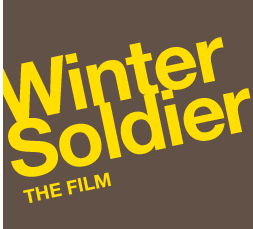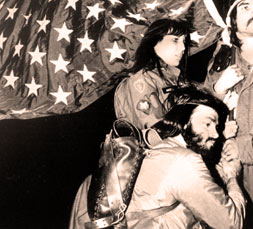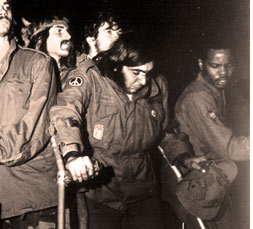Winter Soldier documents the "Winter Soldier Investigation" conducted by Vietnam Veterans Against the War (VVAW) in Detroit, Michigan in the winter of 1971. A call went out from VVAW to veterans all over the country saying, in effect, 'everyone is talking about the war that you know from the inside. If you want to have anything to say about it, come to Detroit and tell it like you saw it.' At the investigation, over 125 veterans representing every major combat unit to see action in Vietnam, gave eye-witness testimony to war crimes and atrocities they either participated in or witnessed. The purpose of the investigation was to bring to light the nature of American military policy in Vietnam. The Winter Soldier Investigation was held around the time of the trial of Lieutenant William Calley, a trial involving the massacre, by American soldiers, of civilian inhabitants of the village of My Lai. The veterans at the Investigation were attempting to give testimony to the fact that My Lai was not the only time or place where such treatment of the Vietnamese people took place. In the winter of 1776, almost two hundred years before, Thomas Paine wrote "These are the time that try men's souls. The summer soldier and the sunshine patriot will, in this crisis, shrink from the service of his country; but he that stands it now deserves the love and thanks of man and woman." Seeing themselves as the "winter soldiers" paraphrasing Thomas Paine, whose battle was, in part, to make their experiences common knowledge to the American and world public, the veterans who came, presented their own personal testimony concerning the commonplace atrocities, supported by documentary photographs often of their own taking. At the time of the Winter Soldier Investigation (WSI), the press questioned the authenticity of the veterans' testimony. The veterans came to tell their story, not to debate whether it was true. In effect this forced the people from the media, particularly the newspapers, to spend their energy and time checking the stories out. By the second day of testimony, the newspapers were including corroboration in their reports. The front page of the Feb. 2nd Detroit Free Press carried this authentication, "The Free Press found additional witnesses, two ex-Marines, who had no connection with the Winter Soldier Investigation, who confirmed that several Marine companies participated in a search-and-destroy operation inside Laos in February and early March 1969. The Free Press informed its readers that the veterans upon whose testimony it reported had been authenticated by either the Pentagon or the Defense Department."
The film Winter Soldier was shown and praised in Europe, but was largely overlooked in the U.S. because it was a first-hand account of the war in Vietnam which the U.S. was still waging when the film was made. The film is a rare and raw telling, by soldiers in the war in Vietnam, of the training for and the experience of war, in which young men kill and do horrific things to other human beings, in the name of patriotism and comraderie. The Winter Soldier Investigation was an attempt at the process of truth and reconciliation, initiated and carried out by veterans of the war in Vietnam and largely ignored by the government that was continuing to carry on that war. The veterans had hoped that they could speak directly to the American public and in this way could help bring about an end to the war, but there was very limited coverage of the Winter Soldier Investigation in the television. The filmmakers came to understand that if there was to be in-depth coverage of this historic event that the veterans had created in order to be heard, it would come about in the many hours of film they were taking.
Out of this came the film Winter Soldier. One of the filmmakers has written: "The veterans in the film, black and white and Native American, and Asian American and Hispanic American, had gone to be in a war to uphold what they held dear about their country. Not all of them went believing in the war, but many of them did. When they came home they had seen things about themselves, their country, their leaders, about class and race, about sexism in war; things that did not get printed in the newspapers and got no coverage on television even as the American public watched war footage every night on the 'news.' One common theme in what the veterans testified about, that stood out as extraordinary, is that the war in Vietnam was being waged largely against civilians. Each of the men in the film exercised courage in speaking the truth at a time when many of their fellow Americans and fellow veterans called them traitors for speaking what they experienced as truth about the war.
The fact that this process of truth-telling was not respected and honored as a part of the experience of these soldiers is one of the reasons that the subject of the war in Vietnam continues to be misunderstood and misrepresented. This is a very disturbing film about the making of war, the making of young men into killers, the bringing of our society into acceptance of a war against people of a different color, a different culture, all the way around the globe. It brings to the surface of consciousness questions that must be confronted and asked again as our country is again sending off soldiers to die and to kill."
|
The ad hoc group of filmmakers, called Winterfilm, came together to film and edit this historic document in cooperation with VVAW, and felt privileged to be witnesses to the willingness of these young men to talk about their own involvement in the war, and to their courage in bringing to light, for themselves and for the public listening raptly in the auditorium of a Howard Johnson's motel in Detroit, the very nature of this war they had experienced.
|


